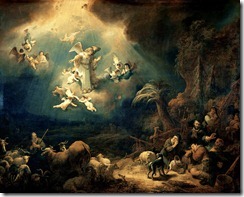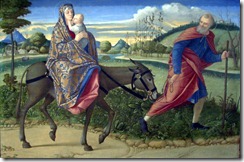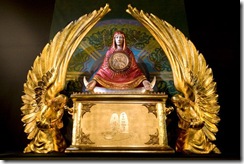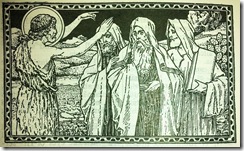 To those with us this evening who are new to St. James, friends and relatives of parishioners, on behalf of Fr. Chuck Walker our pastor and Fr. Stan Osborne our senior associate, and on behalf of Deacon Bill, Deacon Karl, and Deacon Joe, and all of our staff, I welcome you to St. James and wish you a blessed and Merry Christmas. My name is Fr. Matthew Hardesty, the Associate Pastor since June, after my Ordination as a priest in May. I’m very happy to celebrate my first Christmas as a priest with all of you. I’ve been looking forward to this day for quite a while.
To those with us this evening who are new to St. James, friends and relatives of parishioners, on behalf of Fr. Chuck Walker our pastor and Fr. Stan Osborne our senior associate, and on behalf of Deacon Bill, Deacon Karl, and Deacon Joe, and all of our staff, I welcome you to St. James and wish you a blessed and Merry Christmas. My name is Fr. Matthew Hardesty, the Associate Pastor since June, after my Ordination as a priest in May. I’m very happy to celebrate my first Christmas as a priest with all of you. I’ve been looking forward to this day for quite a while.
Typically at Christmas and Easter, we regular Mass-goers look around at the packed pews and wonder, “Where are all these people every Sunday?!” It’s too easy to look down on the so-called “Christmas and Easter Catholics.” I realize that a lot of our large number of folks today are family and friends visiting for Christmas and attending Mass together. I know that “Twice a Year Catholics” aren’t the only ones making up this large congregation – and it’s not my job to beat up on you all every April and December. Still, I would like to speak to the situations of those who do only come to Mass twice a year, but in a more helpful way that I hope everyone will be able to benefit from.
First, if this is your first time to Mass in a long time… welcome back! You may have been startled to find that the prayers are totally different from what you remember! After almost 10 years of study and prayer, the English-speaking bishops of the world implemented revised translations of the prayers of the Mass which we all began to use about 4 weeks ago. It was determined that the language we had used since Vatican II, while fluid and easy to say, had lost much of the nuance and depth of meaning that was intended. So, new vistas of beauty and meaning have been opened to us to us with the revised translations and the prayers are now more closely aligned with Scripture and the tradition of Catholic worship.
This new, more sacred language has been unsettling for all of us, as we have been challenged to step out of what is comfortable and to think again about what we are saying and what it means. This is a new beginning for all of us and I hope – especially – for fallen-away Catholics as well. This is a great time to come back to the Church, a time of new life and energy for worship. We’re all learning to walk again. Hundreds of people, from this parish alone, are studying their faith in groups, asking the tough questions, and getting answers, perhaps unlike they ever have before. Come and be a part of this exciting time. Come join us as we all make our first steps, again, together. No other Church worships like the Catholic Church does. No other Church roots its worship in a continuous, unbroken tradition, stemming from the Apostles, through the Middle Ages, to Today like we do. No other Church has the Eucharist – the Real Body and Blood of Jesus Christ to sustain and feed us – like we do.
Our readings this evening speak most directly though to still other reasons why people fall away from the Church. One reason many men, for example, are not active Catholics today is because of the so-called “feminization” of the Church. Women make up a large percentage of active Catholics, are most involved in the various ministries of the Church, and hold most of the staff positions. Their unique gifts have been a great blessing to the Church. But, some guys then are inclined to think that that there is nothing masculine whatsoever about Catholicism or religion in general. They feel uncomfortable and out of place. “It’s not for me,” they think.
They want a strong priest, with a strong backbone, and a firm handshake who has convictions, who shares their interests, who they can relate to. They want strong role models and brothers they can share their faith with in a uniquely masculine way. I, for one, am trying to live my still-new Priesthood in that way. St. Luke’s Gospel this evening gives us a glimpse of a true role model: St. Joseph.
It is Joseph who took Mary, pregnant with the Son of God by the power of the Holy Spirit, to Bethlehem in order to register in the census; it is Joseph who, in doing this, fulfilled the prophecy of Micah that the Messiah would be born in Bethlehem; it is Joseph who worked to provide for and protect his family by finding shelter in a nearby cave when there was no room in the inn.[1] St. Bernadine of Siena explains that it was Joseph, our Holy Patriarch, who was “a father to our Lord Jesus Christ and a faithful spouse to the Queen of the Universe, our Lady of the Angels. The eternal Father chose Joseph to be the guardian and protector of his greatest treasures, his Son and his Spouse, and Joseph fulfilled his calling with perfect fidelity. If the Church is indebted to the Blessed Virgin for having given Christ to us, then, after Mary, great gratitude and veneration is also owed to St. Joseph.”[2]
Guys, let’s get back in the game and follow St. Joseph’s lead. He shows us how a man does Catholicism: By being chaste and just; by protecting his family not only from financial or physical hardship, but from spiritual burdens as well; by leading them with his own example; by being a source of strength and guidance. Do we really want our sons and daughters to say of us, “Father took a back seat to the things that matter most.” I don’t think so. I know I don’t want that said of me by all of you, my spiritual sons and daughters.
The eternal Son of God chose to become a man precisely in the context of a human family with a human father and a human mother. Every Christmas he comes again into our own families, making all things new. This is the time when every father can start again if needed, to see himself as the guardian of his own holy family; a time when every man with the power of grace can pray well and do great things.
As much as gender roles have evolved over the decades, studies still continue to show that children learn the most about how to live inside the home from their mothers and how to live outside the home from their fathers. Even when mothers bring their children to Mass every Sunday and are very involved in the Church, the greatest indicator that that faith will continue in children is the faith of the father. When fathers lead the way out the door to Mass every Sunday morning, they teach their children that this is how life is lived outside of the home – among others who pray and are active in their faith.
My final point is about the shepherds who received from the angel the good news of the birth of the Savior, Christ the Lord – this scenario, too, can address a reason why some people leave the Church or are not active in it. Long ago, God swore a covenant oath that David would always have an heir to his dynasty. Here in Bethlehem, the hometown of King David and the site of his anointing as king, Jesus Christ is born.[3] By connecting Jesus with David, Luke shows us that Jesus is the long awaited Messiah-King; He is the one who fulfills God’s promises.
The fact that this good news was first revealed to shepherds, an occupation frowned upon by religious Jews, is very consoling for us. This indicates that divine salvation extends to all people. As with these men, God favored numerous shepherds in the Old Testament, including Abel, Jacob, Joseph, Moses, David, and Amos. No matter how unusual or under-classed these shepherds seemed to be, God still used them to witness to his Eternal Son, Emmanuel, God-With-Us. To these shepherds, an entire army of God’s angels proclaimed, “Glory to God in the highest and on earth peace to those on whom his favor rests.” This peace is not the mere absence of conflict but a peace rooted in one’s reconciliation with God.[4]
Sometimes people leave the Church because of shame they feel from something they have done wrong or a situation they have gotten themselves into. The good news is that, like these lowly shepherds, and the mighty shepherds of the Old Testament, whatever happened doesn’t have to disqualify you from witnessing God’s presence. Repent, if you need to, and receive God’s healing mercy, grace, and forgiveness in the Sacrament of Reconciliation. Let us help you with whatever it was that pushed you away. For example, there are many very common misunderstandings about annulments, excommunication, Holy Communion, etc. Give us a chance to walk with you through the suffering to communion again. Come to me personally and I will do all I can to help you. There is a website I also recommend that is very professionally done called “CatholicsComeHome.org.” That website can be helpful in taking the first step.
So many of you are indeed very faithful. I am very blessed to have St. James as my first priesthood assignment. So many of you come to daily Mass, to Mass every Sunday, and to the Sacrament of Reconciliation showing that you take seriously your spiritual lives, have a sense of sin in your life, and a reliance on God’s grace. So many of you spend many hours in Eucharistic Adoration, in youth ministry, in helping the poor through our St. Vincent de Paul chapter, and in many other ministries and devotions. You’ve never fallen away. But to you too, and to all of us, the message remains the same: As part of the holy family that is the Church, Christ is born into our hearts. Through Jesus, the Savior, Christ, and Lord, we are rescued from sin, have a new king in our lives, and a mediator enthroned at God’s right hand. We all are called to receive in our lives the Messiah, the Anointed One, who brings the hope and joy of heaven to us. Every one of us is called to have the faith and courage of St. Joseph and the humility of the shepherds as we accept change in the Church and acknowledge our need for continued reconciliation. If we follow St. Joseph and the shepherds, Christ can continue to make all things new in our lives.
[1] The Navarre Bible, commentary Lk 1:1-2:23
[2] Ibid.
[3] Ignatius Catholic Study Bible, commentary Lk 2:4
[4] Ibid Lk 2:14




